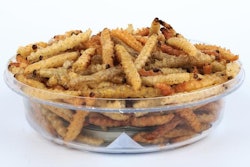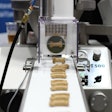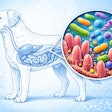
Addition of a commercially available Bacillus subtilis probiotic to dog food may improve the digestive health of dogs compared to a diet without the additive. The makers of Calsporin, a strain of Bacillus subtilis, and University of Zaragoza, Spain collaborators published evidence that Bacillus subtilis improves fat and carbohydrate digestibility in dogs’ guts. The dogs also produced higher quality feces and had healthier levels of ammonia in their digestive systems.
The Journal of Applied Animal Research published the researchers’ results.
Experiment on Bacillus subtilis probiotics effects on dog gut health
In the experiment, sixteen Beagles ate either a low-energy control diet or the same dog food supplemented with Bacillus subtilis. The experimental dog food contained 1 × 109 CFU/kg of the bacterial probiotic. The Beagles ate one of the two dog foods for four weeks with eight dogs eating each diet. Prior to the experiment, all the dogs ate a high-energy diet for two weeks. Throughout the experiment, researchers collected and analyzed fecal samples.
After two weeks, the probiotic diet dogs had firmer feces than the control diet animals, as well as higher dry matter content. Over four weeks, ammonia levels declined in the probiotic group, as fecal pH rose.
“Dog food supplementation with Calsporin at 1 × 109 CFU/kg improved faecal quality, enhanced fat and carbohydrate digestibility, and contributed to the gut health of dogs by reducing gut ammonia and increasing SCFA content,” wrote the researchers in the abstract of their publication.
Asahi Calpis Wellness Co. of Tokyo, Japan produces Calsporin. The probiotic has been used in livestock since 1986.
Probiotics may help gut-brain axis to boost pet wellness
The recent study published in the Journal of Applied Animal Nutrition adds to a growing body of research on probiotics. Other research suggests that the health of an animal’s digestive system correlates to their psychological and physical well-being. During his presentation at Petfood Forum 2018, Bart Dunsford, PhD, business development manager with Lallemand Animal Nutrition, discussed the gut-brain axis. He also examined how probiotics, such as those supplied by his employer, can facilitate pet wellness.
While most research focus on the effects of probiotics on human’s gut-brain axis, there have been 49 studies on that relationship in pets, he said. Of these, 34 were conducted with living animals, although most of these were rodents. However, some scientists have studied probiotics in dogs and cats.
For example, researchers studied the effects on dogs of diet supplementation with probiotic bacteria, Bifidobacterium longum. The scientists observed that the probiotic seemed to have an anxiolytic, or anxiety reducing, influence on the dogs. Following probiotic supplementation, 90 percent of dogs improved their day-to-day anxious behavior, including a reduction in barking, jumping, spinning and pacing when compared a placebo supplement.
Probiotic microorganisms in the pet food industry
Probiotics used in the pet food industry primarily are either bacteria from the Lactobacilli and Bifidobacterium species or yeast, such as Saccharomyces cerevisiae boulardii. These same species appear in human probiotic supplements, which have grown in popularity over the past few decades.
“I think it’s obviously a very strong trend and we understand the value that it brings,” Dunsford told Petfood Industry. “Consumers are doing it for themselves and are realizing it’s okay. So, they need them for their pets as well. It’s a bridge between themselves, what they eat and helping the overall wellbeing of their animal.”
Lallemand’s sales people have seen growing interest in some of the company’s specialty strains of probiotics, beyond conventional varieties.
“They have very good functions above and beyond some of the traditional strains, and when put together, it actually gives some really nice synergy with the bacterial and the yeast probiotics,” he said.


















